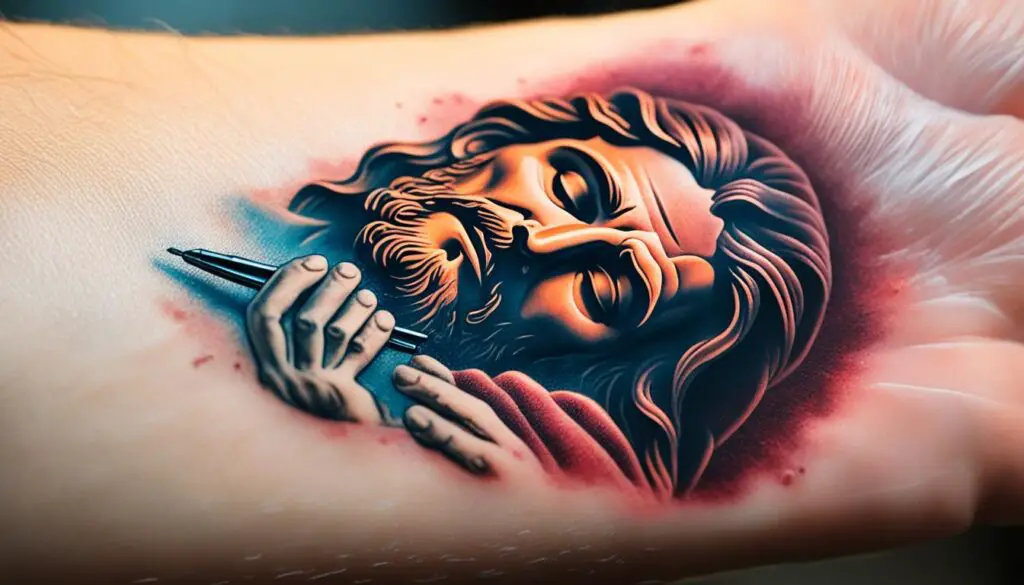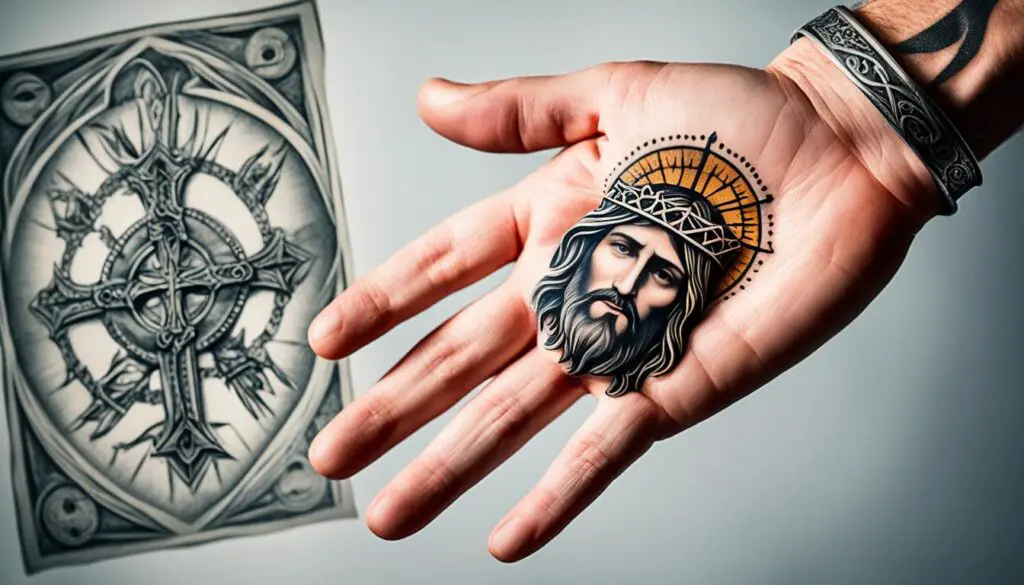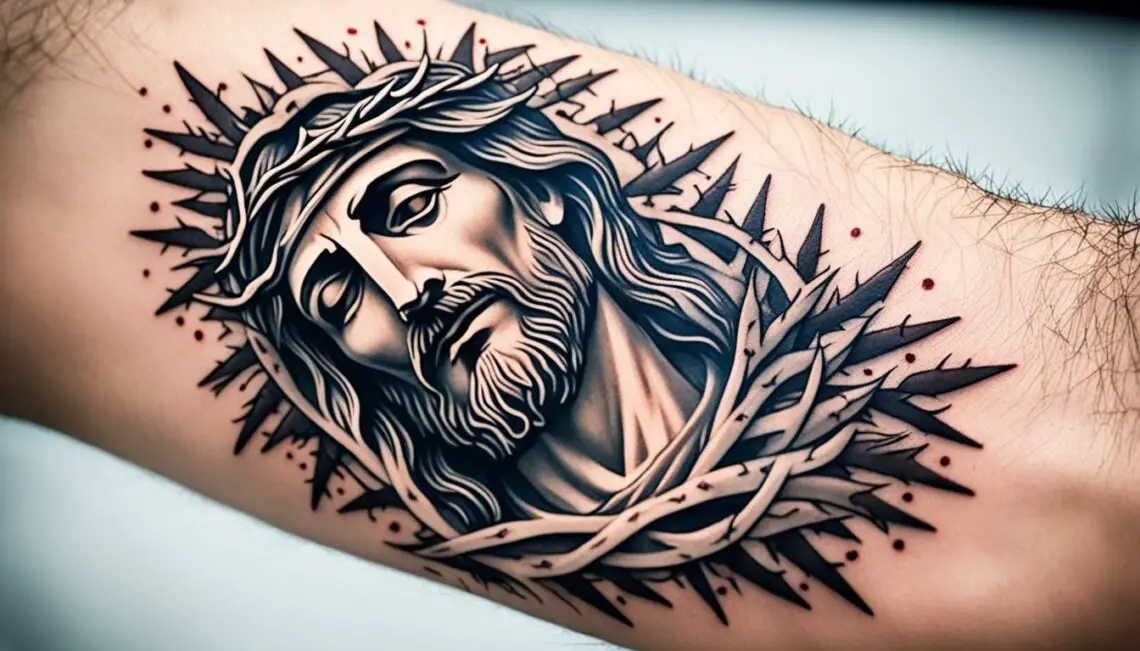In this thought-provoking article, we embark on a fascinating journey to explore the age-old question: does Jesus have a tattoo? This enigmatic inquiry has captured the curiosity of believers and scholars alike, prompting us to delve into the historical and biblical perspectives on religious tattoos and their place in spirituality.
Throughout history, tattoos have served as powerful expressions of faith, symbols of devotion, and reflections of religious beliefs. But what about Jesus? Was he adorned with inked symbols? Let us uncover the truth behind these intriguing speculations.
Key Takeaways:
- Religious tattoos have played a significant role in Christianity, serving as visible expressions of faith and devotion.
- Examining depictions and descriptions of Jesus’ physical appearance can shed light on the possibility of him having a tattoo.
- Understanding the cultural context of tattoos during Jesus’ time helps us discern their prevalence among Jewish communities.
- Theological perspectives on tattoos within Christianity vary among different denominations and scholars.
- Tattoos can hold profound symbolic meanings, acting as personal statements and reminders of one’s spiritual journey.
The Role of Religious Tattoos in Christianity
Religious tattoos have long been revered as powerful expressions of faith and symbols of devotion within the Christian community. Throughout history, individuals have embraced the art of tattooing to honor their religious beliefs and create a lasting connection with their spirituality.
These tattoos often feature religious symbols such as crosses, angels, doves, or verses from the Bible. Each design carries profound meaning and serves as a visual representation of one’s devotion to their faith. For many believers, these tattoos are not merely decorative but serve as constant reminders of their spiritual journey and commitment to their religious beliefs.
Christianity places great emphasis on faith and its expression through various forms, including body art. Religious tattoos provide believers with a unique way to showcase their devotion and openly share their faith with others. In a world that can sometimes be hostile towards religious beliefs, tattoos act as a visible proclamation of one’s commitment to their Christian values.
Moreover, these tattoos often spark conversations and serve as a catalyst for meaningful discussions about the role of spirituality in one’s life. They can serve as a beacon of hope, inspiring others to explore their own faith and engage in dialogues about religious beliefs.
Religious Symbols and Their Significance in Tattoos
When it comes to religious tattoos, the choice of symbols is deeply personal and varies among individuals. Some may opt for a simplistic cross, representing the crucifixion of Jesus Christ and the foundation of Christianity. Others may choose more elaborate designs, such as the ichthys fish symbolizing the early Christian community or the image of a dove representing the Holy Spirit.
Whatever the symbol, each holds profound meaning and evokes a sense of spiritual connection. These tattoos act as a continuous reminder of the presence of a higher power in one’s life and serve as a source of strength during challenging times.
The image above exemplifies the intricate beauty and diversity of religious tattoos within the Christian tradition. It showcases the artistry and devotion that go into the creation of these tattoos, while also emphasizing the unique ways individuals express their religious beliefs through body art.
As we continue our exploration into the question of whether Jesus had a tattoo, it is crucial to recognize the role of religious tattoos in Christianity. They hold immense significance as visual expressions of faith, reflecting the rich spiritual heritage of believers and serving as a tangible connection with their religious beliefs.
Examining Jesus’ Physical Appearance
When contemplating whether Jesus had a tattoo, we delve into the various depictions and descriptions of his physical appearance in religious texts and historical accounts. By analyzing how Jesus is traditionally portrayed, we can gain insights into the possibility of him having a tattoo.
Throughout history, artists and writers have illustrated Jesus in diverse ways, capturing his essence and symbolism. These depictions offer glimpses into his physical attributes and provide clues about the likelihood of tattoos.
Imagine a serene Jesus, with his compassionate eyes and flowing hair. His gentle countenance and radiant aura evoke a sense of purity and spiritual divinity. Yet, could there be hidden markings on his body, discreetly illustrated in the intricate details?

The visual representations of Jesus often showcase him in traditional garments, such as a simple robe or tunic, leaving a significant portion of his body exposed. This raises intriguing questions about the potential presence of tattoos.
However, it is important to note that historical accounts and religious texts do not provide definitive evidence of Jesus having a tattoo. The absence of explicit references leaves room for interpretation and speculation.
As we proceed, we will explore the cultural context of tattoos during Jesus’ time and delve into theological perspectives to gain a holistic understanding of this fascinating topic.
Historical Context of Tattoos in Jesus’ Time
To understand the possibility of Jesus having a tattoo, it is essential to explore the cultural context of tattooing during his time. Tattoos and body art held significant historical significance in ancient civilizations, reflecting personal and cultural identities.
In societies such as ancient Egypt, Mesopotamia, and Greece, tattoos were not uncommon. They were often used to symbolize religious beliefs, cultural affiliations, and personal achievements. Symbols and intricate designs adorned the bodies of individuals in these ancient cultures, serving as visible expressions of their identity and spirituality.
However, when it comes to Jewish communities during the time of Jesus, the historical evidence on tattooing is less conclusive. The Old Testament book of Leviticus includes a verse that forbids cutting or marking the flesh, which has been interpreted by some as prohibiting tattooing. Nevertheless, it is important to note that this prohibition may have been specific to certain types of ceremonial markings and not tattoos in general.
Thus, while tattooing was prevalent in neighboring cultures during Jesus’ time, its practice among Jewish communities is not definitively documented. The absence of specific references to tattooing in religious texts makes it challenging to determine whether Jesus or other individuals of that era had religious tattoos.
While we may never know for certain whether Jesus had a tattoo, exploring the historical context allows us to consider the possibility. It prompts us to appreciate the significance of tattoos as a form of spiritual body art, connecting individuals to their beliefs and traditions.
Theological Perspectives on Tattoos
When it comes to religious tattoos, different denominations and theologians hold diverse views that shape the theological perspectives within Christianity. For some, tattoos serve as powerful expressions of faith and devotion, while others may have reservations about their use of religious symbols on the body.
Religious tattoos, with their intricate designs and symbols, can be seen as visual representations of deeply rooted beliefs. They can serve as a constant reminder of one’s commitment to their religious faith, acting as a source of inspiration and strength.
The Power of Faith and Tattoos
Those who choose to get religious tattoos often find solace in the connection between their physical body and their spiritual beliefs. For them, religious tattoos become a way to visibly and proudly announce their faith to the world, creating opportunities for conversations and connections with others who share similar beliefs.
In some cases, religious symbols tattooed on the body can serve as personal talismans, offering protection, guidance, and a sense of spiritual identity. These tattoos can also be seen as an external representation of an individual’s devotion and dedication to their religious principles.
Interpretations of Religious Symbols
The interpretation of religious symbols within tattoos can vary among different Christian denominations and theologians. While some may view religious tattoos as a form of idolatry or a violation of biblical teachings, others interpret them as a legitimate expression of faith and a tangible way to carry religious symbolism with them at all times.
For example, a tattoo of a cross can be seen as a powerful representation of one’s Christian faith, symbolizing the sacrifice of Jesus Christ and the believer’s commitment to following in his footsteps. Similarly, tattoos of doves, angels, or biblical verses can hold deep spiritual meaning, representing peace, protection, and the word of God.
A Personal Expression of Faith
Ultimately, the decision to get a religious tattoo is a deeply personal one, guided by one’s own beliefs, convictions, and relationship with their faith. While some Christians may embrace tattoos as an integral part of their spiritual journey, others may find alternative means of expressing their faith.
It is essential to remember that while religious tattoos can be a powerful expression of faith, faith itself transcends physical appearances and symbols. True faith resides in the heart and actions of an individual, and tattoos are but one way some choose to externalize their inner commitment.
In the next section, we will explore how tattoos can carry symbolic meanings in spiritual contexts and delve into their significance for individuals on their spiritual journeys.

The Symbolism of Tattoos in Spiritual Contexts
Tattoos have long been seen as more than just ink on the skin. They often carry deep symbolic meanings and have a special significance in the realm of spirituality. In this section, we explore the profound symbolism behind tattoos in spiritual and religious contexts.
The Power of Symbolic Tattoos
Symbolic tattoos can serve as powerful visual representations of one’s beliefs, values, and spiritual journey. They encompass a wide range of religious symbols that hold deep meaning for individuals seeking to express their faith in a tangible way.
Religious symbols such as crosses, lotus flowers, mandalas, Om signs, and hamsas are commonly incorporated into spiritual body art. These symbols hold specific meanings across different faith traditions and often evoke a sense of connection to the divine.
A Means of Personal Expression
For many individuals, getting a symbolic tattoo is a deeply personal act of self-expression. It allows them to convey their beliefs, experiences, and spiritual convictions in a visually striking manner. Each tattoo becomes a distinct reflection of their unique spiritual journey.
Symbolic tattoos provide a sense of identity and a way to visually connect with their faith community. They serve as a constant reminder of one’s spiritual values and can offer comfort, inspiration, and a sense of purpose in daily life.
A Connection with the Divine
Tattoos featuring religious symbols can also act as a conduit for connecting with the divine. They serve as a physical manifestation of one’s devotion, signifying a deep spiritual bond and commitment to a higher power.
By adorning their bodies with religious symbols, individuals create a tangible link to their spiritual beliefs. It becomes a way to stay connected, centered, and grounded in their faith, serving as a source of strength and inspiration during challenging times.
Embracing Spiritual Body Art
Across different spiritual traditions, the practice of getting tattoos as a form of spiritual body art has gained prominence. From Native American tribal tattoos to ancient Celtic symbols, the rich history of spiritual tattoos continues to inspire individuals today.
Symbolic tattoos, with their profound meanings and spiritual connotations, have become a popular choice for those seeking to express their faith and spirituality through body art. They embody a deep connection to something greater than themselves, serving as a visual reminder of their spiritual path.
As we continue our exploration, we move into the absence of direct biblical evidence regarding Jesus’ tattoos. Join us in the next section as we delve into the intriguing discussion surrounding this topic.
The Absence of Direct Biblical Evidence
While the Bible provides valuable insights into the life and teachings of Jesus Christ, the question of whether Jesus had a tattoo remains unanswered.
Despite the absence of direct biblical evidence, this intriguing topic has sparked various arguments and perspectives.
Some argue that biblical teachings imply a prohibition on tattoos, pointing to passages such as Leviticus 19:28 which states, “You shall not make any cuts on your body for the dead or tattoo yourselves: I am the Lord.”
This interpretation suggests that tattoos may be contrary to religious beliefs.
However, alternative viewpoints exist, highlighting that the context of this biblical passage refers to specific cultural practices during that time.
Moreover, it is crucial to consider the teachings of the New Testament, which emphasize spiritual transformation and a focus on the heart rather than outward appearances.
While the discussion continues, it is essential to recognize that the absence of direct biblical evidence does not definitively answer the question of whether Jesus had a tattoo.
Religious beliefs and interpretations can vary among individuals and denominations, leading to a diverse range of perspectives on this matter.

Personal Interpretations and Contemporary Practices
In today’s world, religious tattoos have become a profound form of expression among Christians. These tattoos serve as visual representations of an individual’s deep-rooted beliefs and their personal relationship with God. Through ink and art, believers channel their faith into intricate designs that hold spiritual significance.
Examples of religious tattoos abound, showcasing the diverse ways Christians incorporate their faith into body art. Some choose to ink religious symbols like crosses, ichthys (fish), or doves. These timeless emblems act as powerful reminders of their commitment to Christ’s teachings and their identity as followers of Christianity.
Others opt for scriptural verses or passages inked onto their skin. These excerpts from the Bible not only convey personal meaning but also serve as a source of inspiration and strength in daily life. Whether it’s a verse from Psalms or the words of Jesus himself, these tattoos serve as constant reminders of God’s love and guidance.
The spiritual body art of today’s Christians has also witnessed the incorporation of contemporary designs and artistic styles. From realistic portraits of Christ to abstract representations of faith, these tattoos capture the essence of an individual believer’s unique connection with their spirituality.
Moreover, religious tattoos have transcended mere decorations to become testimonies of transformation. Many Christians view their tattoos as a visual narrative of their journey with God, showcasing the ways in which they have grown in faith and overcome challenges.
Through religious tattoos, Christians find solace and empowerment in expressing their devotion to their beliefs. These tattoos become beacons of light, sparking conversations and providing opportunities to share their faith with others.
In conclusion, religious tattoos hold a special place in contemporary Christianity, amplifying personal interpretations of faith and serving as a tangible reminder of one’s spiritual journey. The unique combination of art, devotion, and symbolism makes these tattoos powerful tools in strengthening the connection between individuals and their religious beliefs.
Conclusion
After a thorough exploration of the historical, theological, and personal perspectives surrounding the question of whether Jesus had a tattoo, we find ourselves without a definitive answer. While there is no direct biblical evidence to support or refute the notion of Jesus having a tattoo, this discussion has provided valuable insights into the enduring power of religious tattoos in Christianity.
Throughout history, religious tattoos have served as expressions of faith, symbols of devotion, and reminders of personal spiritual journeys. They have allowed individuals to connect with their beliefs on a profound level and wear their spirituality proudly on their skin. From ancient cultures to modern times, tattoos have facilitated a unique form of religious expression within the Christian community.
While the debate about Jesus’ tattoo may continue, it is important to remember that the absence of direct biblical evidence should not diminish the significance of religious tattoos for those who choose to bear them. Each tattoo tells a story, represents a personal connection to faith, and serves as a visual testament to one’s spiritual journey. Whether adorned with religious symbols or inspired by biblical teachings, religious tattoos continue to be a powerful and meaningful expression of devotion for many Christians today.





